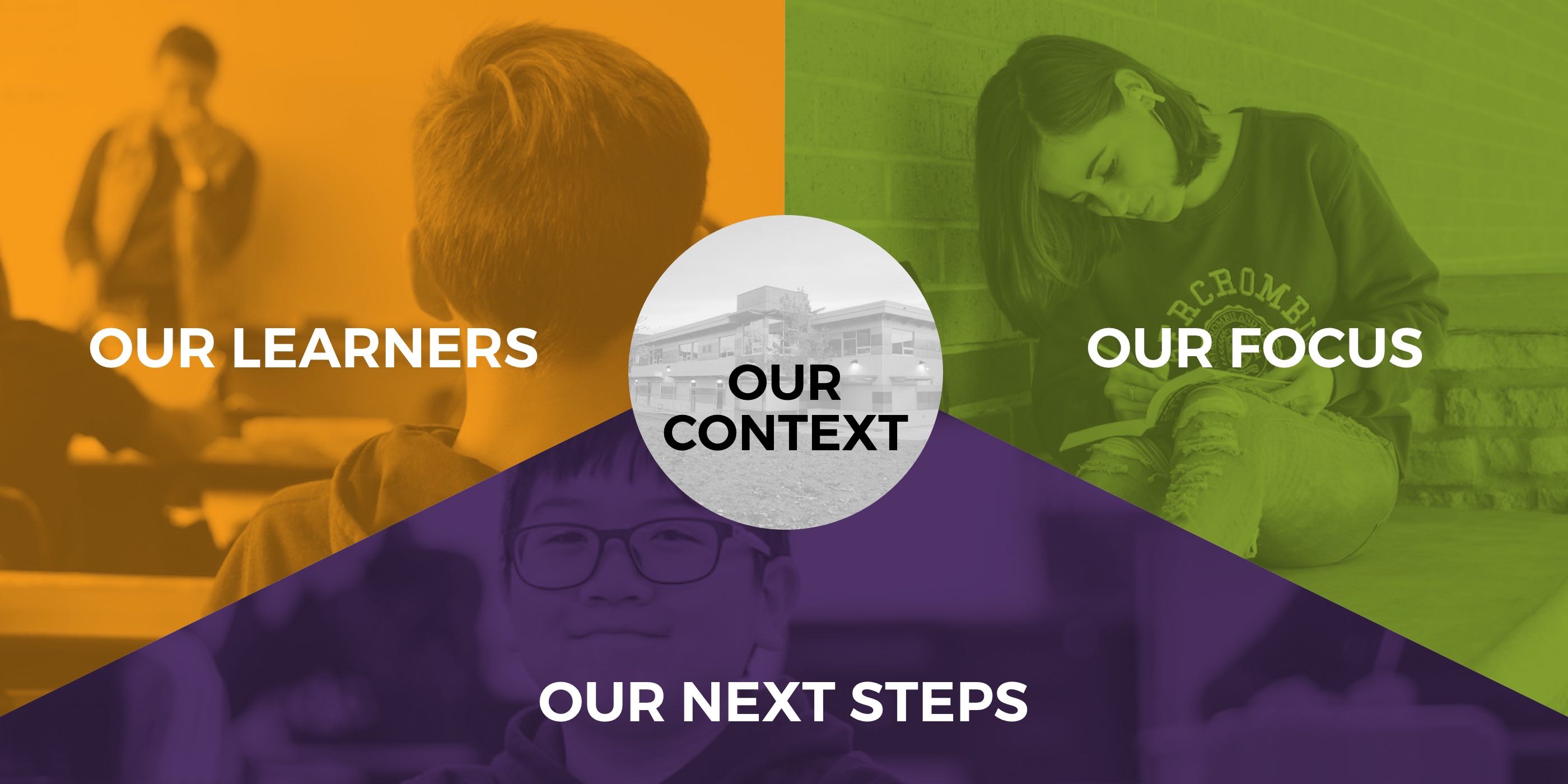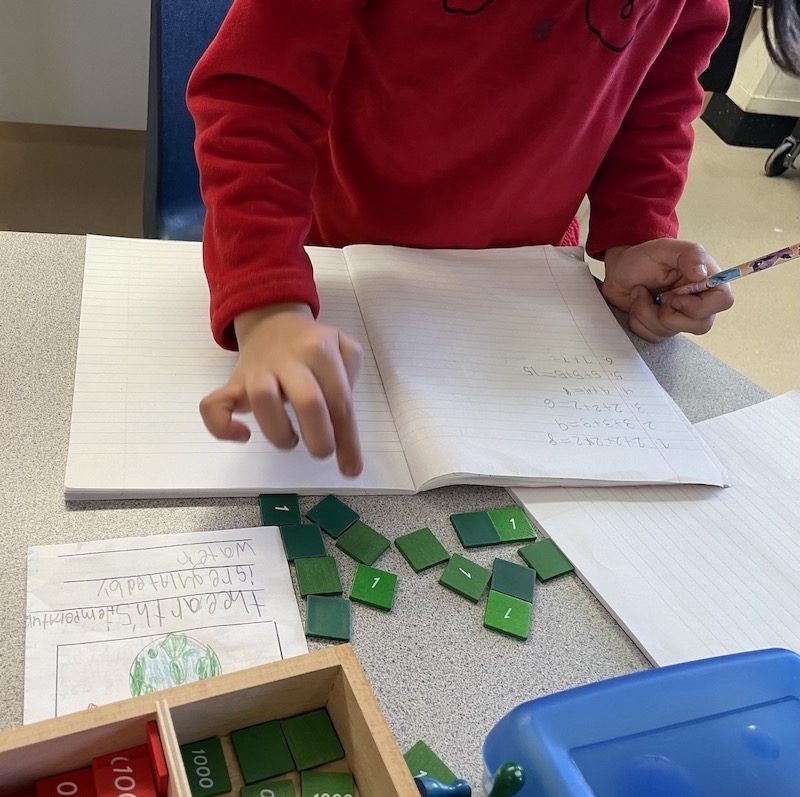Mountainview Montessori 24-25


OUR CONTEXT

In our Montessori school we learn together peacefully and responsibly by caring for each other and the world
At Mountainview Montessori, we value Maria Montessori’s view of education as a process of involving the whole child, and one that respects each child's uniqueness. The aim of the Montessori philosophy is to provide a learning environment that enhances the development of intellectually reflective individuals who are caring and ethical members of the community. Additionally, we teach the importance of leadership, freedom and independence that is bound by respect for others and responsibility towards the environment. Solving problems in peaceful ways is encouraged daily at our school, in the classroom, on the playground, and in all aspects of our lives. Grace and courtesy are key components of the Montessori approach, and children have many opportunities to demonstrate this both in their classrooms and out in the school community.
The role that parents play is key in our Montessori community. The relationship and partnership between home and school is vital to the success of every child.
Maria Montessori: A Pedagogical Anthropology
Maria Montessori’s philosophy of education, with all its vitality and vision, is the foundation of our Surrey program, founded in 1981. Maria Montessori viewed education as a process involving the whole child, respecting their uniqueness and ability to shape their own future.
It is the task of the teacher to create an environment which is most favourable to the enhancement of concentration, and to provide the child with the means with which to educate themselves. Any unneeded help can be considered a hindrance to the student’s learning. This requires that the teacher get to know each child and assist them at their own rate of progress. For this reason, children usually spend three years with the same teacher although both class size numbers and grade groupings can look different as we work within the public school system.

The Montessori materials in the classroom enable the child to take advantage of sensitive periods for the acquisition of skills and knowledge. Classroom materials stimulate the child’s reasoning and imagination, prompting them to connect the concrete, sensory world to the realm of the abstract. Once the child has mastered a particular task, they are guided to a new area of learning to explore in further depth through independent study. This new learning follows the interests of the child and activities are based through their wonders.
The curriculum has an integrated approach, with the child learning first about the unity of the universe and then focusing on its constituent parts. Teachers follow Maria Montessori’s guidance to, “follow the child” in curriculum design and implementation. We are a hybrid of Montessori and public education and ensure the requirements of B.C. curriculum are reached.
Although freedom and independence are cultivated, the child learns that their liberty is bounded by respect for others and responsibility towards their environment. The child’s integration in a multi-age group fosters an interdependent disposition which leads to the goal of becoming peaceful people.
The Montessori program places an emphasis on respecting and caring for the environment. A global viewpoint is encouraged, and Montessori teachings support an appreciation of diversity and interdependence of people and the natural world.
OUR LEARNERS
OUR LEARNERS

At Mountainview Montessori our learners feel safe and supported. We build connections, trusting relationships, and safe learning environments in order to engage in deep, reflective learning. We care and respect our environment, and each other with an appreciation of diversity and the interdependence between people and the natural world.

Our school has identified written communication as an area of growth for our students This has informed our school focus. We have observed that people who communicate in writing effectively ensure understanding of their audience.
Through a Spirals of Inquiry process in the fall of 2023, our staff began to look deeply at the writing skills of their students. FSA results in Literacy provided some information. Further evidence was gathered by holding a school wide write. In order to remove bias, teachers did not assess their own student's work and exchanged with another teacher. The results provided areas of focus for our primary and intermediate teams.
During the 2023-2024 and 2024-2025 school years teachers were introduced and implemented a new writing resource that targets specific areas of the Writing Performance Standards.
During the 2023-2024 school year, a group of 8 primary and intermediate teachers held a book study of Powerful Literacy in the Montessori Classroom by Zoll, Feinberg and Saylor.

During the 2024-2025 school year, a group of teachers held a book study of How to Become a Better Writing Teacher by Carl Anderson and Matt Glover.

To evaluate student growth in writing, School Wide Writes were conducted in both Fall 2024 and Spring 2025, complemented by an analysis of the FSA literacy results.
OUR FOCUS
OUR FOCUS
At Mountainview we have both a core competency focus on our student's Social Emotional Learning (SEL), specifically in the area of Social Awareness and Responsibility and a curricular focus in literacy, specifically writing.
As a small school community, our SEL cohort is school-wide and our writing focus is grades 1-7.
1. Social Awareness and Responsibility
Social Awareness and Responsibility involves the awareness, understanding, and appreciation of connections among people, including between people and the natural environment. Social Awareness and Responsibility focuses on interacting with others and the natural world in respectful and caring ways. People who are socially aware and responsible contribute to the well-being of their social and physical environments. They support the development of welcoming and inclusive communities, where people feel safe and have a sense of belonging.
A socially aware and responsible individual contributes positively to their family, community, and environment; empathizes with others and appreciates their perspectives; resolves problems peacefully; and develops and sustains healthy relationships.
In order to develop personal awareness and responsibility in our students, we are focused on developing the following areas:
- identifying student personal values and strengths and abilities to determine ways they can contribute to their communities and care for the environment
- demonstrating curiosity about their natural world by experiencing and interpreting the local environment
- recognizing our shared responsibility for the local environment
- caring for self, others and neighbourhood through personal or collective approaches
- self-regulating to resolve problems
- developing understanding of how relationships and cultural contexts shape who we are and how we build relationships with others
To support our SEL goals, we implemented the following during the 2024-2025 school year:
- implementation of 7 Sacred Teachings language school wide. We held regular Sacred Teachings themed assemblies over the year to introduce each animal, its meaning, how it relates to our values, behaviours, and treatment of one another. We held these over both the 2023-2024 school year and 2024-2025 school year.
- introduced visual posters of all our 7 Sacred Teachings with the developed language throughout the school.
- SEL lead introduced 'SEL with Cody'—a segment at each staff meeting where a student-centered SEL activity is shared for teachers to implement in their classrooms.
- continued implementation of Second Step in all classrooms grade K-6.
- SEL lead implemented a picture book share and rotating discussion series for all K–7 classes, featuring books that explore both social-emotional learning and racial equity themes.
- enhanced the biodiversity of our school grounds by planting additional trees throughout the property.
- continued the development of our school garden, expanding it to include six vegetable garden beds alongside our existing six Indigenous plant beds. Students engaged in learning about the traditional indigenous uses of plants, deepening their understanding of local ecosystems and cultural knowledge.
- applied for a Parks Canada biodiversity grant to support our efforts in increasing biodiversity on our school grounds.

2. Literacy- Writing
Communicating provides a bridge between peoples' learning, their personal and social identity, and the world in which they interact. People who communicate effectively use their skills and strategies intentionally to ensure understanding by their audience. They communicate in an increasing variety of contexts, for a variety of purposes, and often with multiple audiences.
At Mountainview, we are able to express our thoughts and ideas in a clear and coherent manner and communicate effectively.
In the primary grades, we identified the following areas needing further development:
• planning and creating a piece of personal writing for an audience.
• communicating ideas and information clearly through personal writing.
• communicating using sentences and most conventions of Canadian spelling, grammar and punctuation.
In the intermediate grades, we identified the following areas needing further development:
• use the writing and design process to plan, develop, and create a piece of personal writing for an audience.
• use language in creative and playful ways to develop style.
• communicate in writing using paragraphs and applying conventions of Canadian spelling, grammar, and punctuation.
Between the 2023–2024 and 2024–2025 school years, our students demonstrated significant growth in their writing skills.
FSA results:

In Grade 4, our students’ literacy FSA results showed a remarkable increase in the percentage of students who were on track or extending—from 56% (below the district and provincial averages) to 79% (well above both benchmarks).
In Grade 7, our students’ literacy FSA results remained steady at 82%, consistently performing above both the district and provincial averages, with the majority of students on track or extending in literacy. School Wide Write Results:
School Wide Write Results:
Between Fall 2024 and Spring 2025, our primary students demonstrated a 24% increase in the number of students who were proficient or extending in writing, rising from 39% to 63%.
Between Fall 2024 and Spring 2025, our intermediate students demonstrated a 15% increase in writing proficiency, with the percentage of students who were proficient or extending rising from 50% to 65%.
Through a focused approach to writing instruction—including increased classroom time dedicated to the writing process, targeted professional development for teachers, and the implementation of new instructional resources—we have seen significant growth in our students' writing proficiency.

OUR NEXT STEPS
OUR NEXT STEPS
A Shift in Curricular Focus: Numeracy Focus
Over the past two years, our school has made writing a central focus, resulting in significant student growth in this area. While we will continue to build on this progress, our school team has collectively decided it is time to shift our curricular focus to numeracy.
To launch this new direction, we will begin the 2025–2026 school year with a professional development day in September, where our entire staff will come together to identify a specific area of focus within the broader numeracy framework.
SEL Focus:
Our work in social-emotional learning (SEL) will continue into the 2025–2026 school year, as we recognize that this is a long-term commitment essential to student well-being and success.
We will:
- amplify our message and deepen student engagement, by continuing with student-led assemblies while also expanding our efforts to include classroom-based lessons and activities. This integrated approach will ensure that key messages are reinforced consistently across both school-wide and classroom settings, fostering a stronger and more cohesive learning community.
- continue with the support of our SEL Lead
- continue to develop our school Peace Garden as a place for reflection, quiet and gardening.
- introduce lessons and activities beyond assemblies to keep goals front of mine.
- expand our focus to intentionally incorporate themes of racial equity. This includes integrating inclusive literature, facilitating classroom discussions around identity and justice, and providing professional development to support staff in creating equitable and emotionally supportive learning environments for all students.
